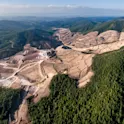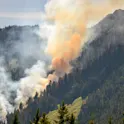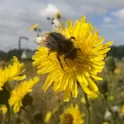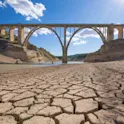Climate action
23 Feb 2022
Sharp drop in flower abundance caused by climate crisis will leave pollinators searching further for food
By Mischa Dijkstra, Frontiers science writer Image credit: Ellen D Moss Researchers simulated the warmer, wetter conditions predicted for northern Europe under climate change, by locally heating agricultural fields by 1.5 ºC and increasing irrigation by 40%. These conditions immediately lead to changes in the community of wildflowers and their associated insects. Most plant species were ‘losers’: they grew fewer flowers, secreted less nectar, and set fewer or lighter seeds. This reduced the food resources for pollinators, stimulating them to visit a wider range of plants. It is predicted that global average temperatures will have risen by between 0.9 and 2.0 ºC around the middle of this century, according to the IPCC’s intermediate emission scenario RCP4.5. As a result, many species, especially specialists with highly specific requirements for food, habitat, and reproduction, won’t be able to adapt. Because approximately 35% of our crops depend on insects for pollination, it is necessary to study impact of global warming on the fitness of insects and the wildflowers on which they depend for food. Once we understand the likely changes, we may be able to mitigate the negative effects for wild and crop plants. Here, a study by scientists from Newcastle University in […]














